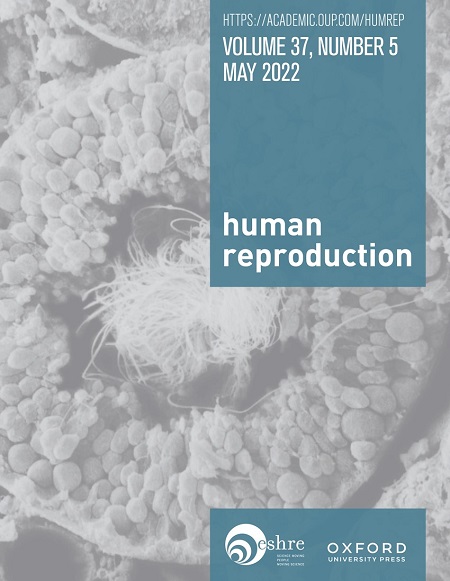The phenotypic and genetic association between endometriosis and immunological diseases.
IF 6
1区 医学
Q1 OBSTETRICS & GYNECOLOGY
引用次数: 0
Abstract
STUDY QUESTION Is there an increased risk of immunological diseases among endometriosis patients, and does a shared genetic basis contribute to this risk? SUMMARY ANSWER Endometriosis patients show a significantly increased risk of autoimmune, autoinflammatory, and mixed-pattern diseases, including rheumatoid arthritis, multiple sclerosis, coeliac disease, osteoarthritis, and psoriasis, with genetic correlations between endometriosis and osteoarthritis, rheumatoid arthritis, and multiple sclerosis, and a potential causal link to rheumatoid arthritis. WHAT IS KNOWN ALREADY The epidemiological evidence for an increased risk of immunological diseases among women with endometriosis is limited in scope and has varied in robustness due to the opportunity for biases. The presence of a biological basis for increased comorbidity across immunological conditions has not been investigated. Here we investigate the phenotypic and genetic association between endometriosis and 31 immune conditions in the UK Biobank. STUDY DESIGN, SIZE, DURATION Phenotypic analyses between endometriosis and immune conditions (17 classical autoimmune, 10 autoinflammatory, and 4 mixed-pattern diseases) were conducted using two approaches (8223 endometriosis, 64 620 immunological disease cases): (i) retrospective cohort study design to incorporate temporality between diagnoses and (ii) cross-sectional analysis for simple association. Genome-wide association studies (GWAS) and meta-analyses for those immune conditions that showed phenotypic association with endometriosis (1493-77 052 cases) were conducted. PARTICIPANTS/MATERIALS, SETTING, METHODS Comprehensive phenotypic association analyses were conducted in females in the UK Biobank. GWAS for immunological conditions were conducted in females-only and sex-combined study populations in UK Biobank and meta-analysed with existing largest available GWAS results. Genetic correlation and Mendelian randomization (MR) analyses were conducted to investigate potential causal relationships. Those immune conditions with significant genetic correlation with endometriosis were included in multi-trait analysis of GWAS to boost discovery of novel and shared genetic variants. These shared variants were functionally annotated to identify affected genes utilizing expression quantitative trait loci (eQTL) data from GTEx and eQTLGen databases. Biological pathway enrichment analysis was conducted to identify shared underlying biological pathways. MAIN RESULTS AND THE ROLE OF CHANCE In both retrospective cohort and cross-sectional analyses, endometriosis patients were at significantly increased (30-80%) risk of classical autoimmune (rheumatoid arthritis, multiple sclerosis, coeliac disease), autoinflammatory (osteoarthritis), and mixed-pattern (psoriasis) diseases. Osteoarthritis (genetic correlation (rg) = 0.28, P = 3.25 × 10-15), rheumatoid arthritis (rg = 0.27, P = 1.5 × 10-5) and multiple sclerosis (rg = 0.09, P = 4.00 × 10-3) were significantly genetically correlated with endometriosis. MR analysis suggested a causal association between endometriosis and rheumatoid arthritis (OR = 1.16, 95% CI = 1.02-1.33). eQTL analyses highlighted genes affected by shared risk variants, enriched for seven pathways across all four conditions, with three genetic loci shared between endometriosis and osteoarthritis (BMPR2/2q33.1, BSN/3p21.31, MLLT10/10p12.31) and one with rheumatoid arthritis (XKR6/8p23.1). LIMITATIONS, REASONS FOR CAUTION We conducted the first female-specific GWAS analyses for immune conditions. Given the novelty of these analyses, the sample sizes from which results were derived were limited compared to sex-combined GWAS meta-analyses, which limited the power to use female-specific summary statistics to uncover the shared genetic basis with endometriosis in follow-up analyses. Secondly, the 39 genome-wide significant endometriosis-associated variants used as instrumental variables in the MR analysis explained approximately 5% of disease variation, which may account for the nominal or non-significant MR results. WIDER IMPLICATIONS OF THE FINDINGS Endometriosis patients have a moderately increased risk for osteoarthritis, rheumatoid arthritis, and to a lesser extent, multiple sclerosis, due to underlying shared biological mechanisms. Clinical implications primarily involve the need for increased awareness and vigilance. The shared genetic basis opens up opportunities for developing new treatments or repurposing therapies across these conditions. STUDY FUNDING/COMPETING INTEREST(S) We thank all the UK Biobank and 23andMe participants. Part of this research was conducted using the UK Biobank Resource under Application Number 9637. N.R. was supported by a grant from the Wellbeing of Women UK (RG2031) and the EU Horizon 2020 funded project FEMaLe (101017562). A.P.M. was supported in part by Versus Arthritis (grant 21754). H.F. was supported by the National Natural Science Foundation of China (grant 32170663). N.R., S.A.M., and K.T.Z. were supported in part by a grant from CDMRP DoD PRMRP (W81XWH-20-PRMRP-IIRA). K.T.Z. and C.M.B. reported grants in 3 years prior, outside the submitted work, from Bayer AG, AbbVie Inc., Volition Rx, MDNA Life Sciences, PrecisionLife Ltd., and Roche Diagnostics Inc. S.A.M. reports grants in the 3 years prior, outside this submitted work, from AbbVie Inc. N.R. is a consultant for Endogene.bio, outside this submitted work. The other authors have no conflicts of interest to declare. TRIAL REGISTRATION NUMBER N/A.子宫内膜异位症与免疫性疾病的表型和遗传关系。
研究问题:子宫内膜异位症患者发生免疫疾病的风险是否增加?是否有共同的遗传基础导致这种风险?子宫内膜异位症患者表现出自身免疫、自身炎症和混合模式疾病的风险显著增加,包括类风湿关节炎、多发性硬化、乳糜泻、骨关节炎和牛皮癣,子宫内膜异位症与骨关节炎、类风湿关节炎和多发性硬化之间存在遗传相关性,并且与类风湿关节炎存在潜在的因果关系。关于子宫内膜异位症女性免疫疾病风险增加的流行病学证据范围有限,并且由于存在偏倚的机会,其稳健性有所不同。存在的生物学基础增加共病跨越免疫条件尚未调查。在这里,我们调查在英国生物银行子宫内膜异位症和31免疫条件之间的表型和遗传关联。研究设计、规模、持续时间采用两种方法(8223例子宫内膜异位症,64620例免疫性疾病)对子宫内膜异位症和免疫状况(17例典型自身免疫性疾病,10例自身炎症性疾病和4例混合模式疾病)进行表型分析:(i)回顾性队列研究设计,纳入诊断之间的时间性;(ii)横断面分析,简单关联。对显示与子宫内膜异位症表型相关的免疫状况(1493- 77052例)进行了全基因组关联研究(GWAS)和荟萃分析。参与者/材料,环境,方法在英国生物银行的女性中进行了全面的表型关联分析。免疫条件的GWAS在UK Biobank的女性和性别组合研究人群中进行,并与现有最大的可用GWAS结果进行荟萃分析。通过遗传相关和孟德尔随机化(MR)分析来研究潜在的因果关系。那些与子宫内膜异位症有显著遗传相关性的免疫条件被纳入GWAS的多性状分析,以促进发现新的和共享的遗传变异。利用来自GTEx和eQTLGen数据库的表达数量性状位点(eQTL)数据,对这些共享变异进行功能注释,以识别受影响的基因。通过生物通路富集分析,确定共享的潜在生物通路。在回顾性队列和横断面分析中,子宫内膜异位症患者发生经典自身免疫性疾病(类风湿关节炎、多发性硬化症、乳糜泻)、自身炎症性疾病(骨关节炎)和混合型疾病(牛皮癣)的风险显著增加(30-80%)。骨性关节炎(遗传相关(rg) = 0.28, P = 3.25 × 10-15)、类风湿关节炎(rg = 0.27, P = 1.5 × 10-5)、多发性硬化症(rg = 0.09, P = 4.00 × 10-3)与子宫内膜异位症的遗传相关性显著。MR分析提示子宫内膜异位症与类风湿关节炎之间存在因果关系(OR = 1.16, 95% CI = 1.02-1.33)。eQTL分析强调了受共同风险变异影响的基因,在所有四种情况下都丰富了七个途径,子宫内膜异位症和骨关节炎共有三个遗传位点(BMPR2/2q33.1, BSN/3p21.31, MLLT10/10p12.31)和一个类风湿关节炎(XKR6/8p23.1)。局限性和谨慎的原因我们进行了首次针对女性特异性免疫条件的GWAS分析。鉴于这些分析的新颖性,与性别组合的GWAS荟萃分析相比,得出结果的样本量有限,这限制了在随访分析中使用女性特异性汇总统计来揭示子宫内膜异位症共享遗传基础的能力。其次,39个全基因组显著的子宫内膜异位症相关变异被用作MR分析中的工具变量,解释了大约5%的疾病变异,这可能解释了名义上或非显著的MR结果。研究结果的更广泛意义:由于潜在的共同生物学机制,子宫内膜异位症患者患骨关节炎、类风湿性关节炎的风险适度增加,在较小程度上,多发性硬化症的风险也有所增加。临床意义主要包括需要提高认识和警惕。共享的遗传基础为开发新的治疗方法或重新利用这些疾病的治疗方法提供了机会。我们感谢所有英国生物银行和23andMe的参与者。本研究的一部分是使用英国生物银行资源进行的,申请号为9637。N.R.得到了英国妇女福利(RG2031)和欧盟地平线2020资助项目FEMaLe(101017562)的资助。A.P.M.得到了Versus Arthritis的部分资助(拨款21754)。国家自然科学基金资助项目(no . 32170663)。N.R, S.A.M和K。 tz部分由CDMRP DoD PRMRP (W81XWH-20-PRMRP-IIRA)拨款支持。K.T.Z.和C.M.B.在3年前报告了拜耳公司、艾伯维公司、Volition Rx公司、MDNA生命科学公司、PrecisionLife有限公司和罗氏诊断公司的资助。S.A.M.报告在此之前3年的资助,除了提交的工作,来自艾伯维公司。N.R.是Endogene公司的顾问。生物,这之外提交的工作。其他作者没有利益冲突需要申报。试验注册号/ a。
本文章由计算机程序翻译,如有差异,请以英文原文为准。
求助全文
约1分钟内获得全文
求助全文
来源期刊

Human reproduction
医学-妇产科学
CiteScore
10.90
自引率
6.60%
发文量
1369
审稿时长
1 months
期刊介绍:
Human Reproduction features full-length, peer-reviewed papers reporting original research, concise clinical case reports, as well as opinions and debates on topical issues.
Papers published cover the clinical science and medical aspects of reproductive physiology, pathology and endocrinology; including andrology, gonad function, gametogenesis, fertilization, embryo development, implantation, early pregnancy, genetics, genetic diagnosis, oncology, infectious disease, surgery, contraception, infertility treatment, psychology, ethics and social issues.
 求助内容:
求助内容: 应助结果提醒方式:
应助结果提醒方式:


